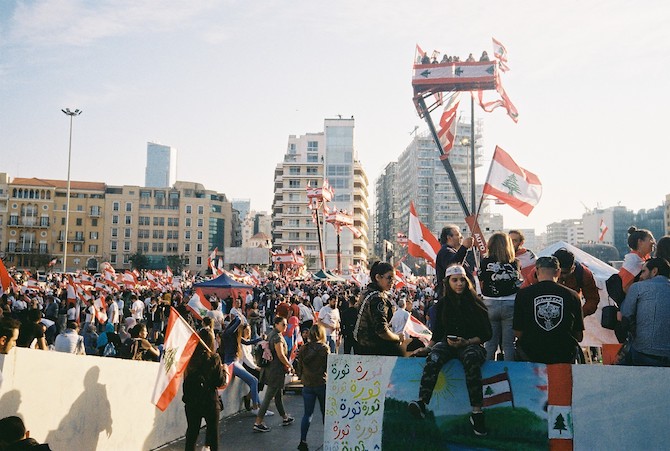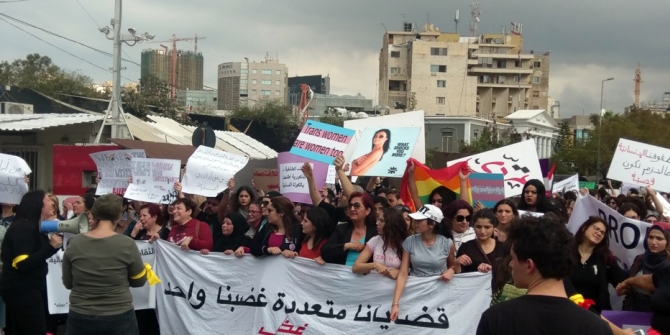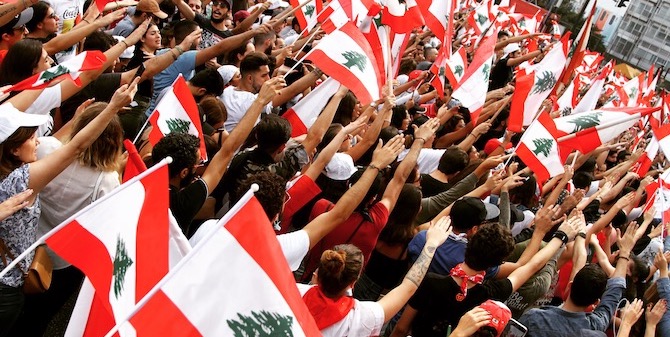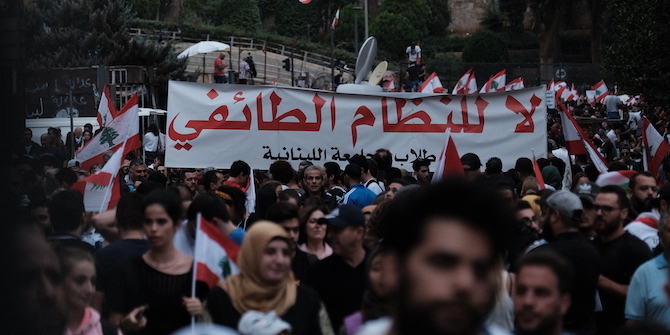by Jinan S. Al-Habbal

Lebanon’s consociational power-sharing political system has spawned several protest movements and cycles of mobilisation in recent years, but its regime has mostly remained unscathed. In October 2019, protests sparked by the then government’s proposed tax hikes quickly turned into nationwide calls to overthrow the sectarian system and corrupt leaders who drove the country into a socio-economic meltdown. The leaderless protest movement, dubbed ‘Thawrat Tishreen’, witnessed an unparalleled participation of Lebanese from all walks of life, confirming their willingness to coalesce around anti-sectarian national interests. They also voiced their disillusionment with the lack of basic services, such as electricity, healthcare, housing and job opportunities. The protests were not restricted to those in the country, with the diaspora rallying outside Lebanese embassies in various countries.
Despite their sectarian, political and ideological differences, the ruling elites joined forces to squash the protest movement that could defy their standing. But their use of overt and covert repression, intimidation, violence, counter-narratives and co-optation failed to deter protestors.
Recognising that taking to the streets alone is not to bring about any political change, some activists decided to organise politically and establish political parties to challenge the system from within. The interviews conducted as part of the ‘Consociationalism and Civil Resistance in Lebanon’ research project confirmed that despite uniting under the umbrella of anti-establishment sentiments and some common objectives, emerging political groups have failed to form a single political alliance and unified electoral lists in the run-up to the parliamentary elections in May 2022.
Opposition candidates, however, reportedly faced systematic attacks – including threats, beatings and vandalism of their campaign billboards – by supporters of sectarian political parties. More importantly, a few weeks before the elections, at least five candidates running on opposition electoral lists withdrew their nominations, citing social or family pressure and even encouraging their supporters to vote for candidates allied with traditional parties.
Despite these impediments, candidates of emerging political movements unexpectedly garnered 13 out of 128 seats in Parliament and formed the Forces of Change bloc. Their victory ascertained a shift in voters’ behaviour to elect new faces and the possibility of alternatives attaining political positions. Although the influence of those reform lawmakers remains unlikely in a parliament controlled by traditional parties, this has not deterred Najat Saliba and Melhem Khalaf from sleeping in Parliament to protest the presidential vacuum.
Emerging political groups have achieved other small but significant victories against the regime. In November 2019, the election of Khalaf as the head of the Beirut Bar Association was hugely welcomed by opposition groups who considered it the first success of the protest movement. Two years later, however, this experience was not repeated due to the lack of a unified opposition coalition, leading to the victory of traditional parties.
Additionally, al-Naqaba Tantafid (The Order Rises/Revolts), an anti-establishment coalition comprising 20 groups, swept the majority of seats in the Order of Engineers and Architects elections, usually dominated by traditional parties, in June 2021. Independent and secular nominees also won most seats in student council elections at several Lebanese universities. The triumph of anti-establishment individuals in these different spheres underscores prospects of political change.
But political participation and activism were not only present on the streets or in elections. Alternative media platforms became a popular source of information for many Lebanese in light of the 2019 protest movement. In our interviews with the founders of some of those platforms, we learned that the absence of a neutral media in Lebanon influenced their decision to create alternative outlets. Not necessarily aiming to overthrow the regime, the founders merely wanted to present an independent source of information – as objectively as possible – that challenged the sectarian status quo. Some of these platforms also offered webinars, which were especially popular during COVID-19 lockdowns, to introduce emerging political movements and raise awareness about the importance of voting. They were also successful in shifting public discourse and paving the way for a reimagining of political life in Lebanon.
Art – including graffiti, cartoons, songs and political satire – has also been used to express political dissent. During the protests, graffiti art dominated and reclaimed public squares and undermined existing power structures, while cartoons portrayed leaders’ corruption and the desire for an alternative society in Lebanon. The lyrics of some songs were also powerful in highlighting the shortcomings of the sectarian regime and reflecting the suffering of society. And political satire emphasised leaders’ sectarian discourse and failure to deal with the country’s crises, while presenting political issues in a simple way for the general audience. In our interviews with several artists, we found that they wanted to echo what was being said on the streets in 2019, strengthen the protest movement and show the harsh reality of the country’s crises. Some also asserted that countering the political narrative through their work was a form of protest. Others argued that laughter and making jokes about politicians was a form of resistance that showed that fear-mongering was not working.
Protests, opposition political groups, alternative media platforms and art are all effective modes of bringing down the political system, but none of them alone can bring about change. Faced with a resilient regime, it is a concentration of these mechanisms, in tandem, that will enable the Lebanese to build the country they want, particularly in a context of economic collapse and political vacuum.
This blog post is part of the research project ‘Consociationalism and Civil Resistance in Lebanon‘, which is part of the LSE Middle East Centre Academic Collaboration with Arab Universities Programme, funded by the Emirates Foundation. Jinan Al-Habbal is the principle investigator on this project.
[To read more on this and everything Middle East, the LSE Middle East Centre Library is now open for browsing and borrowing for LSE students and staff. For more information, please visit the MEC Library page.]






